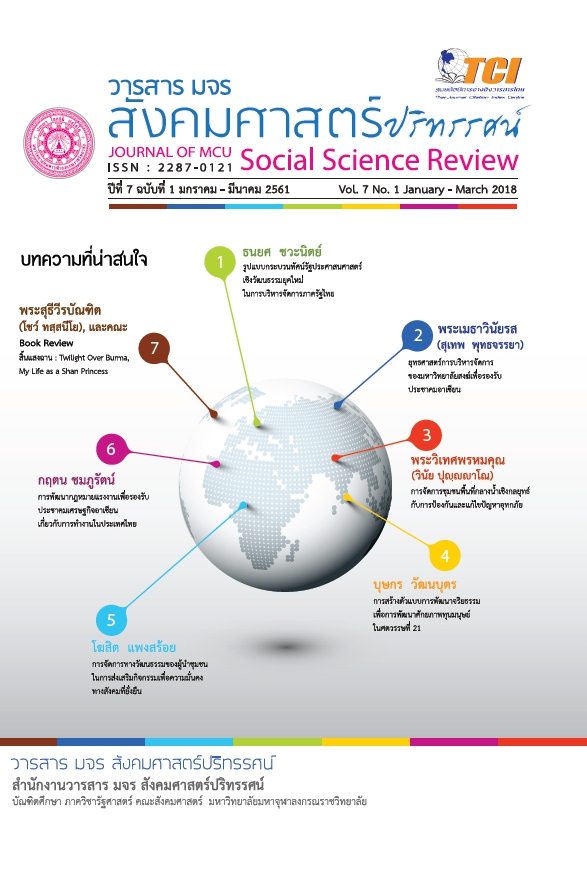การสร้างตัวแบบการพัฒนาจริยธรรมเพื่อการพัฒนาศักยภาพทุนมนุษย์ ในศตวรรษที่ 21
คำสำคัญ:
การสร้างตัวแบบ, การพัฒนาจริยธรรม,ทุนมนุษย์บทคัดย่อ
บทความนี้มีวัตถุประสงค์ คือ 1) เพื่อศึกษาองค์ประกอบในการพัฒนาจริยธรรมเพื่อ
การพัฒนาศักยภาพทุนมนุษย์ 2. เพื่อศึกษากระบวนการและปัจจัยในการพัฒนาจริยธรรมเพื่อ
การพัฒนาศักยภาพทุนมนุษย์ 3. เพื่อสร้างตัวแบบการพัฒนาจริยธรรมเพื่อการพัฒนาศักยภาพทุนมนุษย์ในศตวรรษที่ 21 โดยดำเนินการการวิจัยเชิงคุณภาพ (Qualitative Research) มุ่งศึกษาลักษณะมุ่งศึกษาประเด็นการพัฒนาจริยธรรมและการพัฒนาศักยภาพของทุนมนุษย์ จาก
กลุ่มประชากรตัวอย่างที่เป็นกลุ่มประชากรผู้ให้ข้อมูลสำคัญ (Key Informant) จำนวน 18 รูป/คน ได้แก่ ตัวแทนกลุ่มองค์กรเอกชนที่มีการจัดการทุนมนุษย์สูง จำนวน 5 คน , ตัวแทนกลุ่มองค์กรรัฐบาลที่มีการจัดการทุนมนุษย์สูง จำนวน 4 คน และตัวแทนกลุ่มองค์กรศาสนาและการศึกษาที่มีการจัดการทุนมนุษย์สูง จำนวน 9 รูป/คน โดยทำการสัมภาษณ์แบบเจาะลึก (In-depth Interview) ซึ่งผู้วิจัยจะทำการสุ่มตัวอย่างแบบเจาะจง (Purpose Sampling) ในกลุ่มผู้บริหารสถานศึกษา วิทยากร พระภิกษุ และนักวิชาการ และการสังเกตุแบบไม่มีส่วนร่วมในการอบรมคุณธรรมจริยธรรมของเยาวชน
ผลการวิจัยพบว่า
- องค์ประกอบในการพัฒนาจริยธรรมเพื่อการพัฒนาศักยภาพทุนมนุษย์ พบว่าพื้นฐาน 66.66 % มาจากการสอดแทรกกิจกรรมทางศาสนาในกระบวนการพัฒนา และการสร้างความร่วมมือกับหน่วยงานที่เกี่ยวข้อง
- กระบวนการและปัจจัยในการพัฒนาจริยธรรมเพื่อการพัฒนาศักยภาพทุนมนุษย์ พบว่า 77.77 % เกิดจากการปฏิบัติตามหลักมรรค 8 และ 88.88 % เกิดจาการพัฒนาวินัยขั้นพื้นฐาน
- ตัวแบบการพัฒนาจริยธรรมเพื่อการพัฒนาศักยภาพทุนมนุษย์ในศตวรรษที่ 21 เป็นการกำหนดปัจจัยหรือฟันเฟืองในการพัฒนาคุณธรรมจริยธรรม คิดค้นปัจจัยต่างๆ เพื่อหาวิธีสร้างหลักการคิดและวิธีการปฎิบัติที่ดีงามตามหลักความจริง หลักการปฏิบัติ ถูกต้อง การรู้จักไตร่ตรองว่าอะไรควร ไม่ควรทำกิริยาที่ควรประพฤติซึ่งสังคมแต่ละสังคม กำหนดขึ้นสอดคล้องกับวัฒนธรรม ตามสภาพสังคม วัฒนธรรม มีความประพฤติดีงาม เพื่อประโยชน์สุขแก่ตนและสังคม พบว่า 100 % มาจากการพัฒนาจากการสร้างทักษะ และการพัฒนาคนด้วยคุณธรรม จนทุนมนุษย์ในศตวรรษที่ 21 มีคุณลักษณะเป็นทุนมนุษย์ที่เก่ง ดีและมีความสุข
เอกสารอ้างอิง
Anuwat Krasang. (2014). Human Resource Development in the Buddhist Organizations Under Consumerism. AEE-T Journal of Environmental Education, 3(2), 546-556.
Ikujiro Nonaka, and Hirataka Takeuchi. (1995). The Knowledge Creating Company : How JapaneseCompanies Create the Dynamics of Innovation, New York, [u.a]: Oxford University Press.
Ikujiro Nonaka, and Hirataka Takeuchi. (1995). The Knowledge-creating company:
hoe Japanese companies create the dynamics of innovation, New York : Oxford University Press.
Paul Quintas. (2002). “Managing Knowledge in a New Century”, Managing Knowledge, London : Sage Publication.
Peter F.Drucker. (1994). The Practice of Management . New York : Harper&Row.
Peter M. Senge. (1990). The fifth discipline: the art and practice of the learning organization. New York: Doubleday/Currency.
Surapon Suyaprom. (2015). The Personel’s Competency Development for Staff of Local Administrative Organization According to Buddhism. Journal of MCU Social Science Review, 4(2) (Special Issue), 178-195.
Thitiwut Mhanmee. (2016). The Human Capital Management Supporting The Merit and Ethicis of Staffs in Local Administration Organization. Journal of MCU Social Science Review, 5(3), 203-216.
Thomas A. (1997). Stewart,Intellectual Capital. New York : Doubleday.
Thomas H.Davenport and LaurenePrusak, (2002). WorkingKnowledge: How Organization Manage What They Know, 2nd ed, Massachusette: Harvard Business School Press.
ดาวน์โหลด
เผยแพร่แล้ว
รูปแบบการอ้างอิง
ฉบับ
ประเภทบทความ
สัญญาอนุญาต
ลิขสิทธิ์ (c) 2019 วารสาร มจร สังคมศาสตร์ปริทรรศน์

อนุญาตภายใต้เงื่อนไข Creative Commons Attribution-NonCommercial-NoDerivatives 4.0 International License.
เพื่อให้เป็นไปตามกฎหมายลิขสิทธิ์ ผู้นิพนธ์ทุกท่านต้องลงลายมือชื่อในแบบฟอร์มใบมอบลิขสิทธิ์บทความให้แก่วารสารฯ พร้อมกับบทความต้นฉบับที่ได้แก้ไขครั้งสุดท้าย นอกจากนี้ ผู้นิพนธ์ทุกท่านต้องยืนยันว่าบทความต้นฉบับที่ส่งมาตีพิมพ์นั้น ได้ส่งมาตีพิมพ์เฉพาะในวารสาร มจร สังคมศาสตร์ปริทรรศน์ เพียงแห่งเดียวเท่านั้น หากมีการใช้ภาพหรือตารางหรือเนื้อหาอื่นๆ ของผู้นิพนธ์อื่นที่ปรากฏในสิ่งตีพิมพ์อื่นมาแล้ว ผู้นิพนธ์ต้องขออนุญาตเจ้าของลิขสิทธิ์ก่อน พร้อมทั้งแสดงหนังสือที่ได้รับการยินยอมต่อบรรณาธิการ ก่อนที่บทความจะได้รับการตีพิมพ์ หากไม่เป็นไปตามข้อกำหนดเบื้องต้น ทางวารสารจะถอดบทความของท่านออกโดยไม่มีข้อยกเว้นใดๆ ทั้งสิ้น





